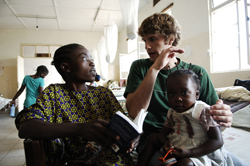Film student travels to war-torn Africa to film documentary
Bachelor of arts: film and media arts
|
Scott Blanding couldn’t believe his eyes as he traveled through the Rwandan national rain forest en route to the Democratic Republic of the Congo. The lush green trees and multicolored foliage that passed before him reminded him of scenes from an animated movie. “It was unreal,” he recalled. “It really was amazing. Rwanda is one of the most beautiful countries in Africa, which is saying something because the whole continent is beautiful.” During his sophomore year, Blanding, his sister Melanie and Brad LaBriola, who graduated from Temple with a degree in film and media arts in 2005, traveled to the DRC to complete a documentary titled Women in War Zones. The film documents the stories of two women who were being treated at Panzi Hospital of Bukavu, at the eastern edge of the Democratic Republic of the Congo, after |
 Photo by Brad LaBriola
With the assistance of international aid groups, Scott Blanding traveled to the the Democratic Republic of Congo to document the stories of two women who were affected by ongoing wars in the country. |
|
suffering violent sexual attacks as the result of wars that raged in the DRC for nearly a decade. In the early ’90s, conflict in Rwanda began to spill over into the DRC. By 1994, rebel groups from Rwanda who fled to the DRC to escape being tried for war crimes began invading Congolese villages. Although the conflict ended in 2004, the people continue to suffer. “The infrastructure is wiped out, medical structure is gone, women are emotionally and physically scarred,” Blanding said. “We met generations of women from the same family who had been assaulted.” “It’s not the type of place where you can show up with a camera and just announce you’re shooting a documentary,” he said. “We partnered with several humanitarian and Christian groups that helped us gain access to the country.” “We came across many women who had heartbreaking stories, but I think the fact that we were there helped them in a way,” Blanding said. “That we came from the other side of the world to record their stories helped them realize that someone cares about them and that they matter.” “This was the most meaningful project I’ve worked on as an aspiring filmmaker,” Blanding said. “It was more than a film. I was being an advocate; it was bigger than me.” After graduation, Blanding hopes to pursue a graduate degree in film. His current projects include a documentary on environmental issues in Belize, a film on the influence of baseball and sugar in the Dominican Republic, and a short documentary on a school for girls in the Democratic Republic of the Congo. |
|